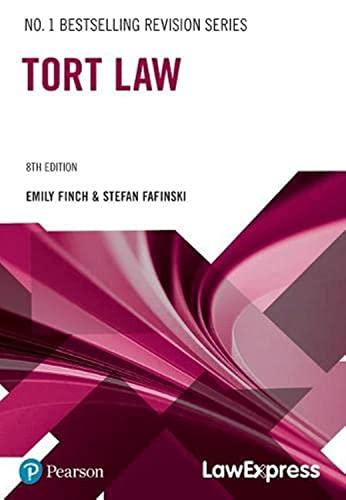Question
In January 2018, Chris entered into a contract with Ben, a local antique vehicle restoration craftsman, for the purchase of a hand-made, tinted windscreen for
In January 2018, Chris entered into a contract with Ben, a local antique vehicle restoration craftsman, for the purchase of a hand-made, tinted windscreen for his 1954 Cadillac Coupe Deville. Ben was well-known in the antique car business and has restored cars for celebrities, politicians and other shady characters for a number of years.
The purchase price of the windscreen was R100 000. It was to be made with a special lead lining to prevent leakage and to render it bulletproof. The contract included an express warranty against water leakage and small arms firefor three years. Before the execution of the contract, Ben and Chris met at a Stellenbosch wine estate. During the course of a leisurely meal, Ben told Chris that he was in the process of incorporating his business into "Antique Car Capers Inc." Some 5 days after the meeting, the contract was signed by Ben as "Ben, for Antique Capers Inc." Ben completed the delivery and installation of the windscreen in June 2018, at which time, at Ben's request, Chris issued his cheque for R100 000 payable to "Antique Car Capers Inc."
The incorporation was finalized on 20 July 2018 and the company was issued with a certificate of incorporation, bearing the same date. The MoI stated that Ben was the sole director, that he held 90 shares and that his girlfriend, Susan, held 10 shares in the company.
Chris' cheque was deposited into the current account of Antique Car Capers Inc on 7 October 2018.
Chris first noticed problems with water leakage around the windscreen in January 2019 when he was caught in a thunderstorm on his way home from work. He was greatly concerned and stopped at the dealership where he bought his beloved car. It was at that time he and the salesperson discovered that the windscreen had not been lead-lined when it was manufactured. The leakage through the windscreen, which resulted from the missing lead lining, caused damage to the interior of Chris' car. The very next day Chris called Ben, but only reached the receptionist at Antique Car Capers Inc. He was told that Ben was out of town and would only return the next week.
Chris duly called Ben the following week and complained about the faulty windscreen, demanding that it be repaired or replaced forthwith. Ben flatly refused without furnishing any reasons. He also refused to pay for the damage caused by the leaks to the interior of the car. In February 2019, Chris hired another company to replace the windscreen and make repairs to his car, at a cost of R180 000.
There is no dispute as to these facts.
In March 2019, Chris duly commenced a lawsuit against Ben personally and against Antique Capers Inc. for breach of the express warranty. He seeks a total of R180 000 in damages, claiming R100 000 for the cost and installation of a new windscreen with a similar warranty, plus R80 000 for repairs to the damaged portion of his car caused by the water leaks.
Antique Capers Inc. moved for summary judgment dismissing the action against it, asserting it could not be liable on a contract that predated its incorporation. In addition, Ben moved for summary judgment dismissing the action against him personally on the ground that he was merely acting as an agent for Antique Capers Inc. when he signed the contract.
How should the court rule on these motions? You are expected to write an motivated opinion to substantiate your answer.
Step by Step Solution
There are 3 Steps involved in it
Step: 1

Get Instant Access to Expert-Tailored Solutions
See step-by-step solutions with expert insights and AI powered tools for academic success
Step: 2

Step: 3

Ace Your Homework with AI
Get the answers you need in no time with our AI-driven, step-by-step assistance
Get Started


